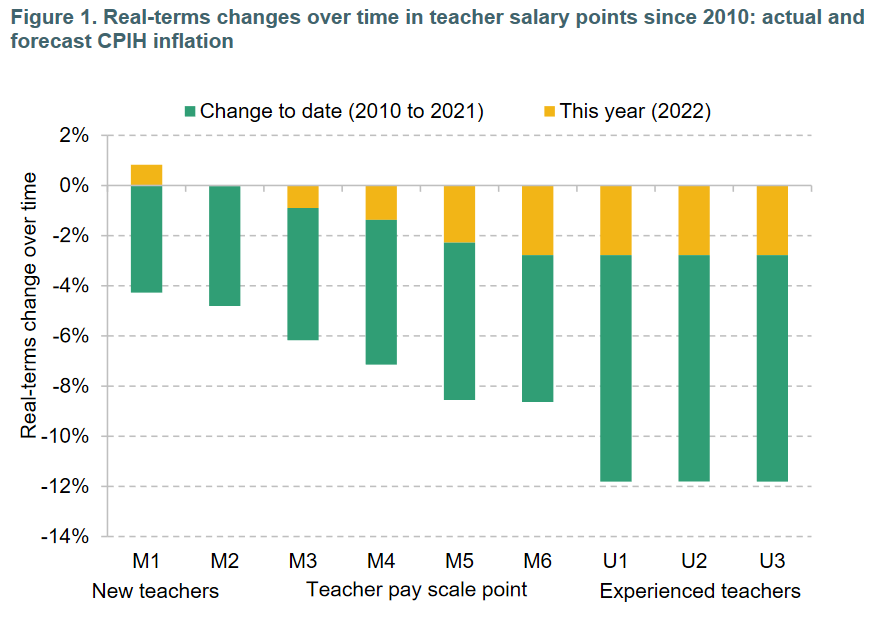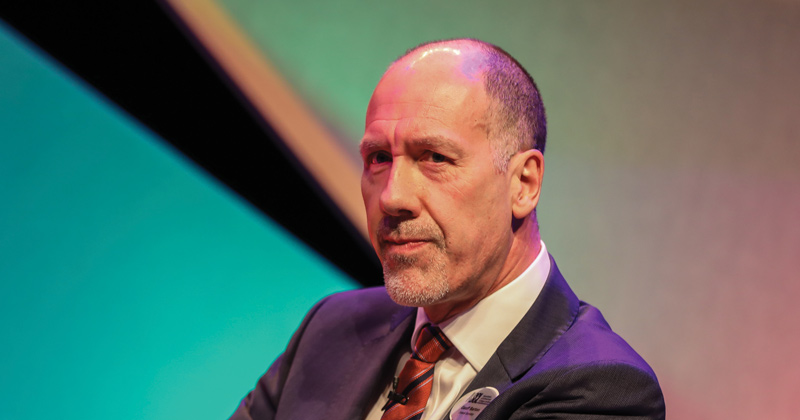Two-thirds of ASCL members back a ballot on industrial action short of a strike and are split on the idea of a full-blown walkout, a response the leader of the usually strike-shy union called “remarkable”.
However, only 2,203 heads (16 per cent of eligible members) responded to the survey on the government’s pay proposals. Union leader Geoff Barton warned legal requirements would make any industrial action “very challenging”.
ASCL, which mostly represents secondary headteachers and trust leaders, consulted its members on whether to ballot for industrial action for the first time in its 16-year history.
Unions have warned the 5 per cent rise proposed for most teachers and leaders this year falls far short of inflation.
National Education Union analysis claims the minimum leadership range salary of £42,195 is nearly £10,000 behind where it should be had pay kept pace with retail price index inflation since 2010 (over 20 per cent less).
Of the ASCL members who responded, 69 per cent said they were in favour of an indicative ballot for action short of a strike, while 31 per cent were against.
Asked whether they would back an indicative ballot on strike action, 50 per cent said yes and 50 per cent said no.
Action short of a strike can include moves like working to rule by only working the hours and days stipulated in contracts, or refusing to carry out tasks requested by the government.
The consultation was the first stage in a long, complex process, and there are significant barriers to industrial action. Unions have to conduct indicative ballots before formally seeking support for action, and at least 50 per cent of members have to vote in any resulting formal ballot.
Support for industrial action ‘remarkable’
Barton said his members were “traditionally extremely reluctant to consider any form of industrial action, and it is therefore remarkable that a majority of survey respondents favour an indicative ballot on action short of strike action, let alone the fact that half back holding an indicative ballot on strike action”.

But he said the union had to “proceed cautiously”, with “complex” legislative requirements for action to be lawful.
“At least 50 per cent of eligible members would need to vote in a ballot, which is a much higher number than those who took part in the survey.
“There are also a number of other legal requirements which make any such move very challenging. So, the survey forms one part of our consultation process, and over the coming weeks we will be talking to members in person at ASCL events and further gauging views.”
NAHT polls members on potential action
It comes as the NAHT leaders’ union also began a similar informal consultation with members about government pay proposals. Like ASCL, the NAHT is asking its mostly primary leader membership if they will support industrial action.
The National Education Union is currently holding an indicative ballot.
Paul Whiteman, NAHT’s general secretary, said the cost-of-living crisis “demands that school teams are properly rewarded now, not at some point in the future”.
“The failure to bring extra funding to schools to support the restoration of appropriate levels of pay, especially as energy bills spiral and inflationary pressures bite in schools, will leave our members having to make cuts that will damage education.
“Being forced to see education decay due to the government’s inaction goes against the professional commitment of school leaders, so we are consulting with members on what can be done to resolve the crisis. We can rule nothing in or out at this stage.”
Unions’ demands equate to 14% pay rise
The two leadership unions alongside the NEU, NASUWT and Community issued a joint call for pay to be restored to 2010 levels last week.
In a briefing, unions warned that teacher pay has “broadly” fallen by about a fifth in real-terms since 2010 “due to a series of pay freezes, pay caps and below-inflation pay awards implemented by the government as part of its austerity policies”.
The Institute for Fiscal Studies estimated earlier this year that despite the pay rises proposed, experienced teachers would still be paid on average 14 per cent less in real terms by 2023 than they were in 2010.
















Your thoughts